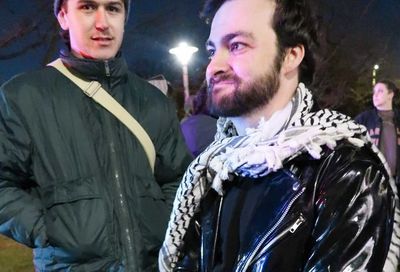Battle of the Brains: Reinhardt and Olson Spar, Nicely, Over Prop 8 Litigation Decisions
 Ted Olson, on a conference call today with reporters, defended the litigation decisions made by his team in Perry v. Schwarzenegger, the challenge to Proposition 8, in response to a question about those decisions raised today by Judge Stephen Reinhardt of the U.S. Court of Appeals for the Ninth Circuit.
Ted Olson, on a conference call today with reporters, defended the litigation decisions made by his team in Perry v. Schwarzenegger, the challenge to Proposition 8, in response to a question about those decisions raised today by Judge Stephen Reinhardt of the U.S. Court of Appeals for the Ninth Circuit.
Even if the Ninth Circuit eventually decides that there is no party with standing to bring an appeal in this case, however, another attorney for the plaintiffs said that the American Foundation for Equal Rights will bring additional litigation as is needed to advance their goal of getting a marriage equality case to the U.S. Supreme Court.
Today, though, Reinhardt took aim at the plaintiffs for creating a situation in which their first case, Perry, might not even result in an appellate decision from his court — let alone a Supreme Court precedent for the country.
In an opinion written only for himself that mused on several ways in which he believed the standing questions that resulted in today’s certification to the California Supreme Court could have been avoided, Reinhardt wrote, “[H]ad Plaintiffs sued a broader class of defendants, there clearly would have been parties who would have had standing to appeal the district court’s decision, and who likely would have done so. Even had they not, it might not have been difficult for those interested in defending the proposition to find an intervenor with standing.”
He added, with a swipe at the one county that did attempt to intervene in defense of the proposition, “Imperial County, one of the counties that voted in favor of Proposition 8, sought to intervene, but for some unknown reason attempted to do so through a deputy clerk who asserted her own rights instead of through the Clerk who might have asserted hers.”
As to the plaintiffs’ decisions, Olson said that they named as defendants “the officials which the California Supreme Court has said are responsible [for enforcing marriage laws]” — the governor and attorney general, who have declined to appeal the trial court ruling striking down Proposition 8 as unconstitutional — as well as the clerks of the two counties in which the plaintiffs had their marriage license applications rejected.
 As to the naming of those clerks, Olson added, “We didn’t even have to do that, and we certainly didn’t have to bring a class action.”
As to the naming of those clerks, Olson added, “We didn’t even have to do that, and we certainly didn’t have to bring a class action.”
Olson, the plaintiffs’ lead attorney, also told the reporters on the call that when making the decision of how to bring the Perry case his team looked at the way that other related Supreme Court cases were brought — from the landmark Supreme Court case of Brown v. Board of Education to marriage cases like Loving v. Virginia and Turner v. Safely to the even the more recent Romer v. Evans, which related to an anti-gay statewide initiative in Colorado.
Olson explained, “If you bring an action against the state officials” who have the ultimate enforcement authority of a law — here, he said, the governor and the attorney general — “and a federal district court with jurisdiction enters a declaratory judgment” against those state officials, “that covers it, that’s dispositive as far as the entire state is concerned.”
He concluded as to the Perry trial decision issued by U.S. District Court Judge Vaughn Walker, “The district court addressed that question and rendered a judgment” against the governor and attorney general. “That, in our judgment, is dispositive.” As such, he explained, the trial court ruling is sufficient to make Proposition 8 unenforceable in all of California even if there is no standing for an appeal.
Such a judgment, even if dispositive, would only impact Proposition 8 and California marriages. Theodore Boutros, another attorney for the plaintiffs, addressed that issue later in the call, saying that AFER will file additional litigation, necessarily in a different state, if the Ninth Circuit eventually decides that there is no standing for the appellate court to hear the appeal in the Perry case.
[Photos: Top, right: Judge Stephen Reinhardt. Bottom, left: Ted Olson.]
Support Metro Weekly’s Journalism
These are challenging times for news organizations. And yet it’s crucial we stay active and provide vital resources and information to both our local readers and the world. So won’t you please take a moment and consider supporting Metro Weekly with a membership? For as little as $5 a month, you can help ensure Metro Weekly magazine and MetroWeekly.com remain free, viable resources as we provide the best, most diverse, culturally-resonant LGBTQ coverage in both the D.C. region and around the world. Memberships come with exclusive perks and discounts, your own personal digital delivery of each week’s magazine (and an archive), access to our Member's Lounge when it launches this fall, and exclusive members-only items like Metro Weekly Membership Mugs and Tote Bags! Check out all our membership levels here and please join us today!





















